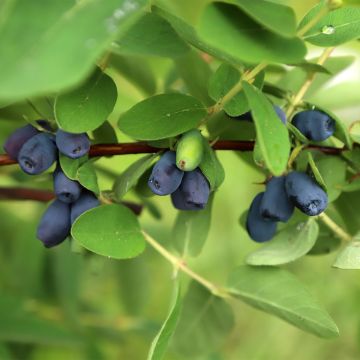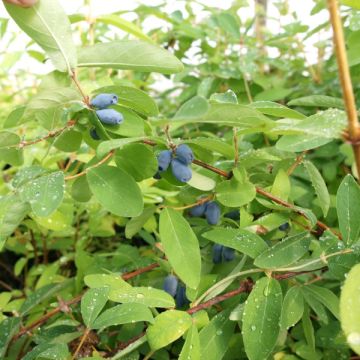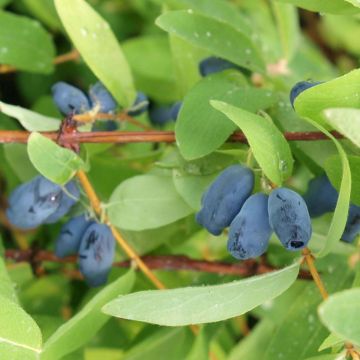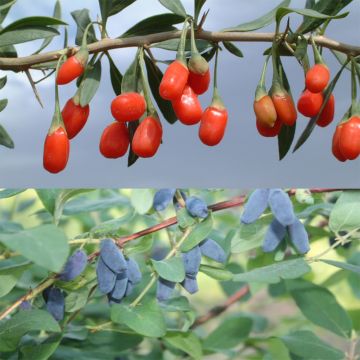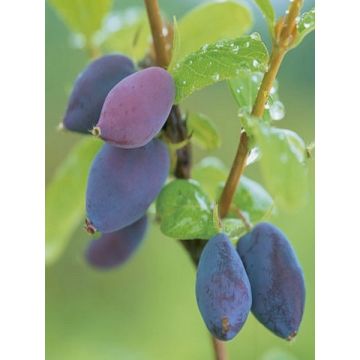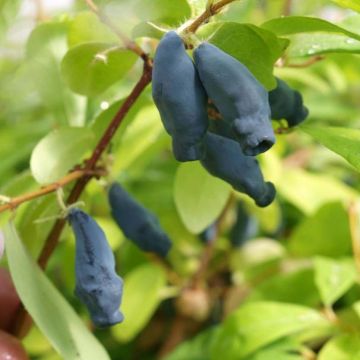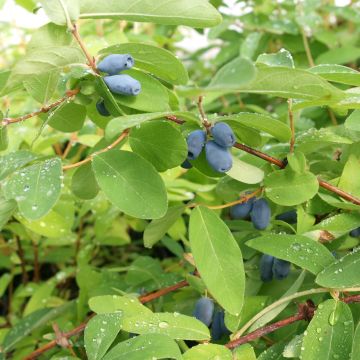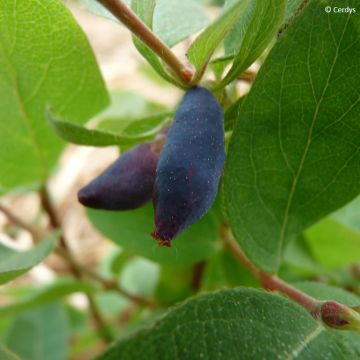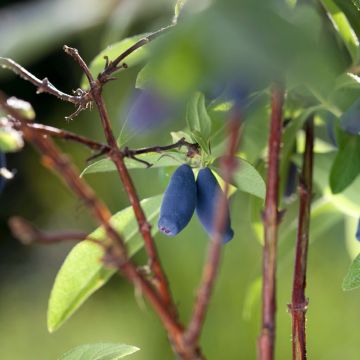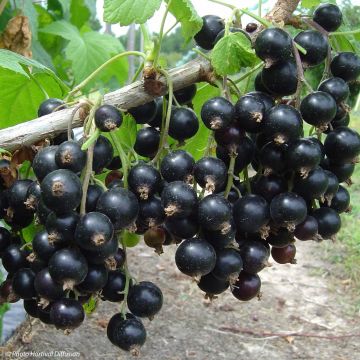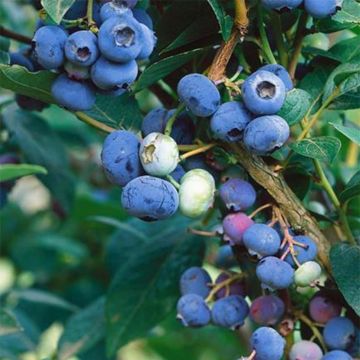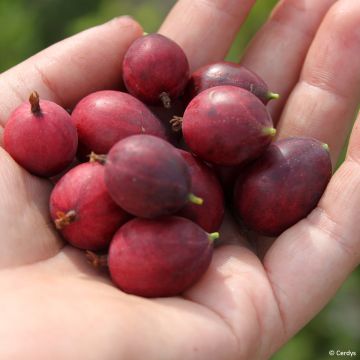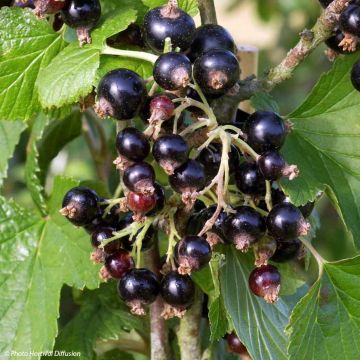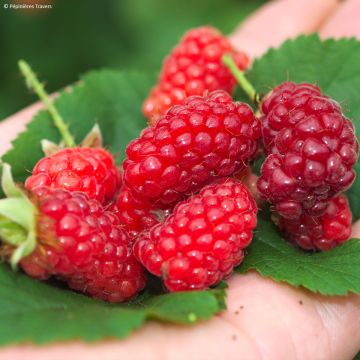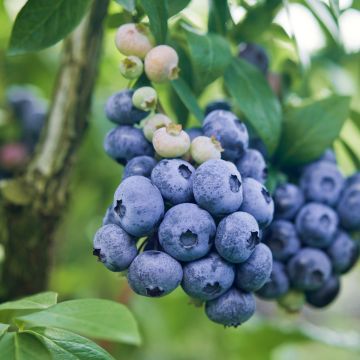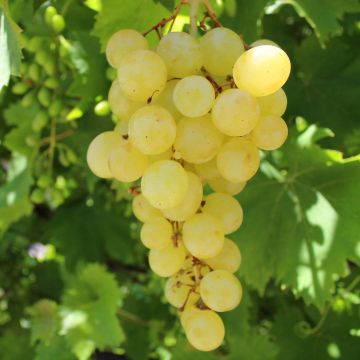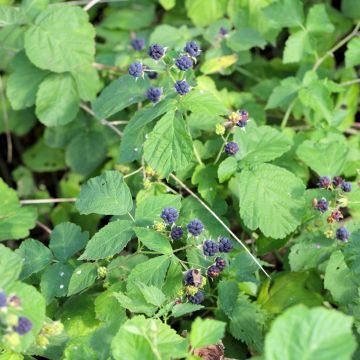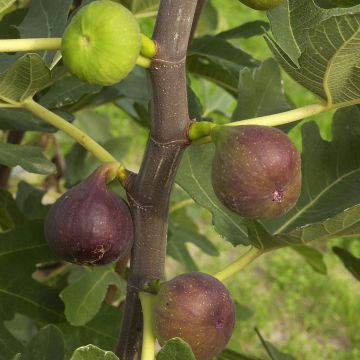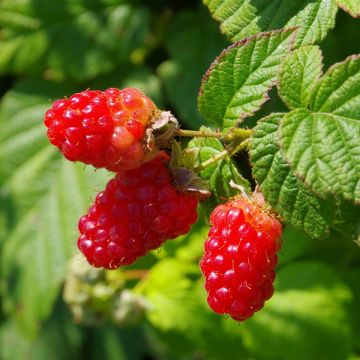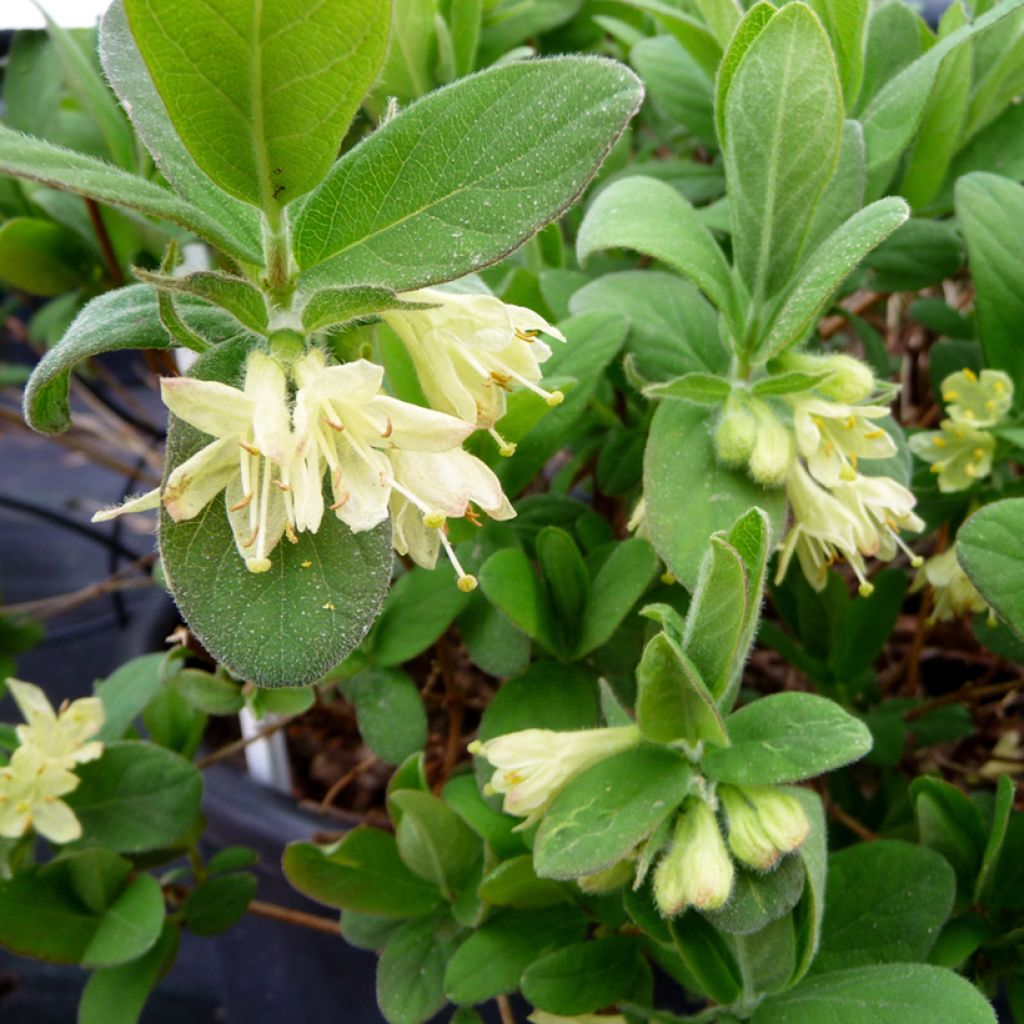

Lonicera caerulea var. kamtschatica Kiev - Honeyberry
Lonicera caerulea var. kamtschatica Kiev - Honeyberry
Lonicera caerulea var. kamtschatica Kiev
Kamchatka Honeysuckle, Blue Honeysuckle, Honeyberry, Sweetberry Honeysuckle
This item cannot be shipped to the selected country
Delivery charge from €5.90
Delivery to Corse prohibited
More information
Schedule delivery date,
and select date in basket
This plant carries a 6 months recovery warranty
More information
We guarantee the quality of our plants for a full growing cycle, and will replace at our expense any plant that fails to recover under normal climatic and planting conditions.
From €5.90 for pickup delivery and €6.90 for home delivery
Express home delivery from €8.90.
Delivery to Corse prohibited: UE law prohibits the import of this plant from mainland France to Corse as part of the fight against Xylella fastidiosa. Please accept our sincere apologies.
More information
Description
Lonicera kamtschatica 'Kiev' is a bush honeysuckle appreciated for its edible fruits. In May-June it produces elongated, blue berries with a sweet and slightly acidic flavour reminiscent of blueberries and sometimes even kiwi. They can be consumed fresh as well as in jam or jelly. This bush is very cold-resistant, to -40°C. It enjoys sun or partial shade and moist, well-drained soils, ideally non-alkaline. Plant it in pairs to promote cross-pollination.
From the caprifoliaceae family, Lonicera kamtschatica, or May berry, is native to Siberia where its edible fruits have been consumed by the indigenous people for a long time. Mentioned for the first time at the end of the 17th century by a Russian explorer named Vladimir Atlasov, it was cultivated in the northern regions of Russia under the advice of Peter Kuzmisev in the early 19th century. Lonicera kamtschatica 'Kiev' stands out for its high productivity. Its foliage is deciduous. Its bluish-green leaves are tough. Its discreet flowering occurs in March-April. The flowers are tubular at the base and grow in groups of two. They are cream-coloured, slightly fragrant, and attract pollinating insects. They can withstand frost to -7 °C.
The flowers, although hermaphroditic, are weakly self-fertile. Therefore, plant at least two plants to promote good pollination (mainly ensured by bumblebees and bees) and good fruiting. Opt for the 'Morena' variety, semi-early, or 'Duet'.
In late spring, harvest its numerous blue and waxy, elongated, about 1 cm long and 0.5 cm in diameter fruits, weighing about 1g. You can consume them fresh, like blueberries, or transform them into jams, jellies, or even fruit juice. The cooked fruit takes on a mahogany red colour.
Report an error about the product description
Plant habit
Fruit
Flowering
Foliage
Botanical data
Lonicera
caerulea var. kamtschatica
Kiev
Caprifoliaceae
Kamchatka Honeysuckle, Blue Honeysuckle, Honeyberry, Sweetberry Honeysuckle
Russia
Other Honeyberry bush
Planting and care
Plant Lonicera kamtschatica 'Kiev' in full sun or possibly in partial shade in the south. It appreciates rich, moist soil, without stagnant moisture, and non-chalky. Space each plant about 1 m apart. Plant several different varieties of berry in close proximity to maximize your harvest. Place mulch around the plant to keep the soil moist, especially in summer. Lonicera kamtschatica 'Kiev' can withstand small droughts and tolerates salt spray well. It is a very hardy bush that will not mind frost.
Planting period
Intended location
Care
This item has not been reviewed yet - be the first to leave a review about it.
Berries
Haven't found what you were looking for?
Hardiness is the lowest winter temperature a plant can endure without suffering serious damage or even dying. However, hardiness is affected by location (a sheltered area, such as a patio), protection (winter cover) and soil type (hardiness is improved by well-drained soil).

Photo Sharing Terms & Conditions
In order to encourage gardeners to interact and share their experiences, Promesse de fleurs offers various media enabling content to be uploaded onto its Site - in particular via the ‘Photo sharing’ module.
The User agrees to refrain from:
- Posting any content that is illegal, prejudicial, insulting, racist, inciteful to hatred, revisionist, contrary to public decency, that infringes on privacy or on the privacy rights of third parties, in particular the publicity rights of persons and goods, intellectual property rights, or the right to privacy.
- Submitting content on behalf of a third party;
- Impersonate the identity of a third party and/or publish any personal information about a third party;
In general, the User undertakes to refrain from any unethical behaviour.
All Content (in particular text, comments, files, images, photos, videos, creative works, etc.), which may be subject to property or intellectual property rights, image or other private rights, shall remain the property of the User, subject to the limited rights granted by the terms of the licence granted by Promesse de fleurs as stated below. Users are at liberty to publish or not to publish such Content on the Site, notably via the ‘Photo Sharing’ facility, and accept that this Content shall be made public and freely accessible, notably on the Internet.
Users further acknowledge, undertake to have ,and guarantee that they hold all necessary rights and permissions to publish such material on the Site, in particular with regard to the legislation in force pertaining to any privacy, property, intellectual property, image, or contractual rights, or rights of any other nature. By publishing such Content on the Site, Users acknowledge accepting full liability as publishers of the Content within the meaning of the law, and grant Promesse de fleurs, free of charge, an inclusive, worldwide licence for the said Content for the entire duration of its publication, including all reproduction, representation, up/downloading, displaying, performing, transmission, and storage rights.
Users also grant permission for their name to be linked to the Content and accept that this link may not always be made available.
By engaging in posting material, Users consent to their Content becoming automatically accessible on the Internet, in particular on other sites and/or blogs and/or web pages of the Promesse de fleurs site, including in particular social pages and the Promesse de fleurs catalogue.
Users may secure the removal of entrusted content free of charge by issuing a simple request via our contact form.
The flowering period indicated on our website applies to countries and regions located in USDA zone 8 (France, the United Kingdom, Ireland, the Netherlands, etc.)
It will vary according to where you live:
- In zones 9 to 10 (Italy, Spain, Greece, etc.), flowering will occur about 2 to 4 weeks earlier.
- In zones 6 to 7 (Germany, Poland, Slovenia, and lower mountainous regions), flowering will be delayed by 2 to 3 weeks.
- In zone 5 (Central Europe, Scandinavia), blooming will be delayed by 3 to 5 weeks.
In temperate climates, pruning of spring-flowering shrubs (forsythia, spireas, etc.) should be done just after flowering.
Pruning of summer-flowering shrubs (Indian Lilac, Perovskia, etc.) can be done in winter or spring.
In cold regions as well as with frost-sensitive plants, avoid pruning too early when severe frosts may still occur.
The planting period indicated on our website applies to countries and regions located in USDA zone 8 (France, United Kingdom, Ireland, Netherlands).
It will vary according to where you live:
- In Mediterranean zones (Marseille, Madrid, Milan, etc.), autumn and winter are the best planting periods.
- In continental zones (Strasbourg, Munich, Vienna, etc.), delay planting by 2 to 3 weeks in spring and bring it forward by 2 to 4 weeks in autumn.
- In mountainous regions (the Alps, Pyrenees, Carpathians, etc.), it is best to plant in late spring (May-June) or late summer (August-September).
The harvesting period indicated on our website applies to countries and regions in USDA zone 8 (France, England, Ireland, the Netherlands).
In colder areas (Scandinavia, Poland, Austria...) fruit and vegetable harvests are likely to be delayed by 3-4 weeks.
In warmer areas (Italy, Spain, Greece, etc.), harvesting will probably take place earlier, depending on weather conditions.
The sowing periods indicated on our website apply to countries and regions within USDA Zone 8 (France, UK, Ireland, Netherlands).
In colder areas (Scandinavia, Poland, Austria...), delay any outdoor sowing by 3-4 weeks, or sow under glass.
In warmer climes (Italy, Spain, Greece, etc.), bring outdoor sowing forward by a few weeks.

































